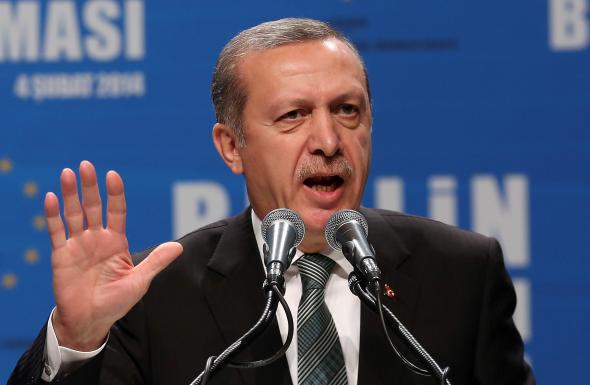Turkey’s ruling party is trying to put a brave face on yesterday’s election results, with Prime Minister Ahmet Davutoglu saying they “once again showed that the A.K. Party is the backbone of Turkey.” But it’s hard to read them as anything other than a dramatic rebuke to the moderate Islamist party and to President Recep Tayyip Erdogan’s attempts to consolidate his power.
The AKP had been hoping to take 330 seats in 550-seat parliament. This would have allowed Erdogan, who was elected president last year after three terms as prime minister, to push through constitutional changes that would convert Turkey to a U.S.-style presidential system, a move his opponents saw a thinly veiled Putin-style power grab. But the AKP not only failed to cross that threshold; it failed to get the 276 seats needed for a parliamentary majority. It’s the first major electoral setback since the party came to power in 2002.
With more than 99 percent of the vote accounted for, the AKP wound up with 258 seats. The CHP, the secularist party that dominated Turkish politics for most of the country’s modern history, was second with 132 seats. The right-wing nationalist MHP won 80 seats, as did the leftist, Kurdish-dominated HDP, which enters parliament for the first time. Turkish parties need at least 10 percent of the vote to enter parliament.
Now, things get interesting. The AKP will need to form a coalition government, but it doesn’t have an obvious partner. The nationalist MHP, which has moderated its fascist and xenophobic tendencies in recent years, is considered the most likely partner, but its leader doesn’t seem too enthusiastic about the idea. If a government can’t be formed within 45 days, new elections may be called; the Turkish lira has taken a tumble due to the new political uncertainty.
Two dramatic years—which have seen a growing number of regional security crises, a slowing economy, a raft of damaging corruption scandals, and criticism over Erdogan’s increasingly authoritarian rule—have taken their toll on Erdogan and his party, even in his traditional political stronghold in Central Anatolia. Many of the AKP’s wounds may be self-inflicted, but the biggest winner of the vote is the HDP, which became the first Kurdish party ever to break through the 10 percent threshold designed in part to keep them out of power and broke the AKP’s majority in the process.
More than 40,000 people were killed in the three-decade conflict between the Turkish government and Kurdish insurgents, but two years ago, the jailed leader of the largest Kurdish rebel group, the PKK, declared a ceasefire that has mostly held since then. Though its opponents attempted to paint it as a front for the PKK, the HDP achieved its breakthrough by appealing to secularists and leftists disenchanted with Erdogan’s rule, including voters galvanized by the 2013 Gezi Square protests in Istanbul. The party put up a strikingly diverse set of candidates, including Christians, Yazidis, and one candidate striving to become the country’s first openly gay MP. (Across all four parties, there are also now a record 96 women in parliament.) In the end, the HDP’s big tent approach worked out better than Erdogan’s decision to double-down on his appeal to religious voters, taking the unprecedented step in the still-technically-secular country of brandishing a Koran on the campaign trail.
Even without the new constitution he wanted, Erdogan will remain the country’s dominant political figure, and his party will remain its most potent political force. But a dramatic power grab may have been prevented yesterday, and it’s encouraging that it was checked by a party that broadened its appeal by transcending its ethnic roots rather than emphasizing them.
